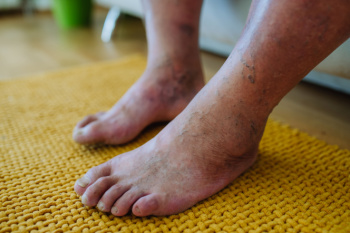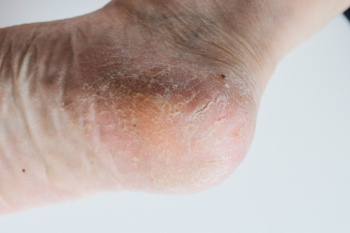Items filtered by date: August 2024
Essential Diabetic Foot Care

Diabetes is a chronic condition that affects the body's ability to regulate blood sugar levels, often leading to complications in the feet. High blood sugar can damage blood vessels and nerves, reducing circulation and sensation in the feet. This makes individuals with diabetes more susceptible to foot injuries and infections, as they may not feel wounds or pressure sores developing. If not properly treated, even minor foot injuries can lead to serious complications, such as ulcers, infections, or in severe cases, amputation. Proper diabetic foot care includes regular inspection of the feet for cuts, blisters, or sores, keeping the feet clean and dry, and wearing properly fitted shoes to avoid friction. Preventive measures like controlling blood sugar levels, regular foot check-ups with a podiatrist, and proper foot hygiene are imperative to avoiding serious complications and maintaining overall foot health. If you have diabetes and notice a foot wound, it is essential to see a podiatrist promptly to prevent an infection.
Diabetic foot care is important in preventing foot ailments such as ulcers. If you are suffering from diabetes or have any other concerns about your feet, contact Sarah Urton, DPM from Kitsilano Foot and Ankle Clinic. Our doctor can provide the care you need to keep you pain-free and on your feet.
Diabetic Foot Care
Diabetes affects millions of people every year. The condition can damage blood vessels in many parts of the body, especially the feet. Because of this, taking care of your feet is essential if you have diabetes, and having a podiatrist help monitor your foot health is highly recommended.
The Importance of Caring for Your Feet
- Routinely inspect your feet for bruises or sores.
- Wear socks that fit your feet comfortably.
- Wear comfortable shoes that provide adequate support.
Patients with diabetes should have their doctor monitor their blood levels, as blood sugar levels play such a huge role in diabetic care. Monitoring these levels on a regular basis is highly advised.
It is always best to inform your healthcare professional of any concerns you may have regarding your feet, especially for diabetic patients. Early treatment and routine foot examinations are keys to maintaining proper health, especially because severe complications can arise if proper treatment is not applied.
If you have any questions please feel free to contact our office located in Vancouver, BC . We offer the newest diagnostic and treatment technologies for all your foot and ankle needs.
Causes of Swollen Feet From Daily Activities

Swollen feet, or edema, can result from various factors. Spending long hours on your feet, such as during extended work shifts or prolonged standing, can cause fluid to accumulate in the lower extremities. Excessive salt intake contributes to fluid retention, exacerbating swelling. Injuries, such as sprains or fractures, often lead to localized swelling as part of the body's inflammatory response. Pregnancy also commonly causes swollen feet due to increased blood volume and pressure on the veins. Each of these causes affects fluid balance and circulation, leading to discomfort and visible swelling. If you notice your ankles and feet have become swollen, it is suggested that you contact a podiatrist who can accurately determine the cause, and offer you effective relief methods.
Swollen feet can be a sign of an underlying condition. If you have any concerns, contact Sarah Urton, DPM of Kitsilano Foot and Ankle Clinic. Our doctor can provide the care you need to keep you pain-free and on your feet.
Swollen feet are a common ailment among pregnant women and people who stand or sit for extended periods. Aging may increase the possibility of swollen feet and patients who are obese often notice when their feet are swelling too. There may be medical reasons why swollen feet occur:
- Phlebitis - A condition that causes the veins to become inflamed and can also cause leg pain.
- Liver disease - This may lead to low blood levels of albumin which is a protein. This can cause fluid in the blood to pass into the tissues and several areas of the body can become swollen.
- Heart failure - When the heart doesn’t pump properly the blood that is normally pumped back to the heart can pool in the veins of the legs causing swollen feet.
- Kidney disease - One of the main functions of the kidneys is releasing excess fluid in the body. This type of condition can make it difficult for the kidneys to function properly, and as a result the feet may become swollen.
- Deep-vein thrombosis (DVT)- This is a serious condition where blood clots form in the veins of the legs. They can block the return of blood from the legs to the heart which may cause the feet to swell. It is important to be treated by a podiatrist if this condition is present.
Swollen feet can also be caused by bone and tendon conditions, including fractures, arthritis, and tendinitis. Additionally, there may be skin and toenail conditions and an infection may cause the feet to swell. Patients who take medicine to treat high blood pressure may be prone to getting swollen feet.
Many patients elevate their feet to help relieve the swelling and this is generally a temporary remedy. When a podiatrist is consulted the reason behind the swelling can be uncovered and subsequently treated.
If you have any questions please feel free to contact our office located in Vancouver, BC . We offer the newest diagnostic tools and technology to treat your foot and ankle needs.
Cracked Heels Relief
 Cracked heels, or heel fissures, are splits in the skin on the heels often caused by dry, thickened skin and excessive pressure on the feet. Factors such as prolonged standing, wearing open-back shoes, obesity, and skin conditions like eczema can contribute to their development. Anyone can experience cracked heels, but they are more common in older adults and those with diabetes. Relief may come from moisturizing, exfoliating, and wearing supportive footwear. If you have deep heel cracks that are painful or show signs of infection, it is suggested that you schedule an appointment for treatment with a podiatrist as quickly as possible to prevent complications. This foot doctor will often prescribe medication for complete healing.
Cracked heels, or heel fissures, are splits in the skin on the heels often caused by dry, thickened skin and excessive pressure on the feet. Factors such as prolonged standing, wearing open-back shoes, obesity, and skin conditions like eczema can contribute to their development. Anyone can experience cracked heels, but they are more common in older adults and those with diabetes. Relief may come from moisturizing, exfoliating, and wearing supportive footwear. If you have deep heel cracks that are painful or show signs of infection, it is suggested that you schedule an appointment for treatment with a podiatrist as quickly as possible to prevent complications. This foot doctor will often prescribe medication for complete healing.
If the skin on your feet starts to crack, you may want to see a podiatrist to find treatment. If you have any concerns, contact Sarah Urton, DPM from Kitsilano Foot and Ankle Clinic. Our doctor can provide the care you need to keep you pain-free and on your feet.
Cracked Heels
It is important to moisturize your cracked heels in order to prevent pain, bleeding, and infection. The reason cracked heels form is because the skin on the foot is too dry to support the immense pressure placed on them. When the foot expands, the dry skin on the foot begins to split.
Ways to Help Heal Them
- Invest in a good foot cream
- Try Using Petroleum Jelly
- Ease up on Soaps
- Drink Plenty of Water
Ways to Prevent Cracked Heels
- Moisturize After Showering
- Skip a Shower
- Keep Shower Water Lukewarm
- Don’t Scrub Your Feet
If you are unsure how to proceed in treating cracked heels, seek guidance from a podiatrist. Your doctor will help you with any questions or information you may need.
If you have any questions, please feel free to contact our office located in Vancouver, BC . We offer the newest diagnostic and treatment technologies for all your foot care needs.
Causes and Symptoms of a Broken Pinky Toe

A broken pinky toe, or 5th phalangeal fracture, can occur due to various reasons such as stubbing the toe against furniture or dropping something heavy on it. Symptoms typically include immediate pain, swelling, bruising, and difficulty in moving the toe. Types of fractures can range from minor hairline cracks to complete breaks that displace the bone. Stress fractures develop gradually from repetitive stress, while traumatic fractures occur suddenly from impact or trauma. Diagnosing a broken pinky toe involves a physical examination and possibly imaging tests like X-rays to determine the extent of the injury. Treatment usually involves rest, elevation to reduce the swelling, and buddy taping the toe to its neighbor toe for support. Severe fractures may require immobilization with a splint or walking boot, and in rare cases, surgery to realign the bones for proper healing. If you have endured a broken pinky toe, it is suggested that you consult a podiatrist who can provide you with the appropriate treatment method.
A broken toe can be very painful and lead to complications if not properly fixed. If you have any concerns about your feet, contact Sarah Urton, DPM from Kitsilano Foot and Ankle Clinic. Our doctor will treat your foot and ankle needs.
What to Know About a Broken Toe
Although most people try to avoid foot trauma such as banging, stubbing, or dropping heavy objects on their feet, the unfortunate fact is that it is a common occurrence. Given the fact that toes are positioned in front of the feet, they typically sustain the brunt of such trauma. When trauma occurs to a toe, the result can be a painful break (fracture).
Symptoms of a Broken Toe
- Throbbing pain
- Swelling
- Bruising on the skin and toenail
- The inability to move the toe
- Toe appears crooked or disfigured
- Tingling or numbness in the toe
Generally, it is best to stay off of the injured toe with the affected foot elevated.
Severe toe fractures may be treated with a splint, cast, and in some cases, minor surgery. Due to its position and the pressure it endures with daily activity, future complications can occur if the big toe is not properly treated.
If you have any questions please feel free to contact our office located in Vancouver, BC . We offer the newest diagnostic and treatment technologies for all your foot and ankle needs.

